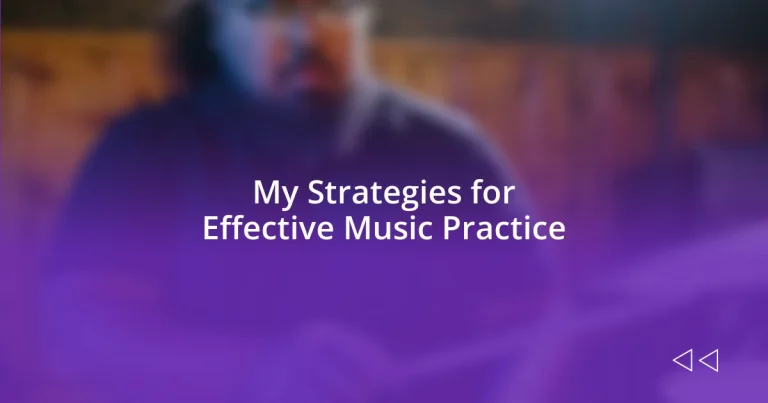Key takeaways:
- Creating a dedicated practice environment with the right lighting and minimal distractions enhances focus and creativity.
- Setting specific, measurable goals and breaking them into manageable segments leads to structured and effective practice sessions.
- Regularly evaluating progress and staying motivated through rewards and community engagement can significantly improve practice outcomes.
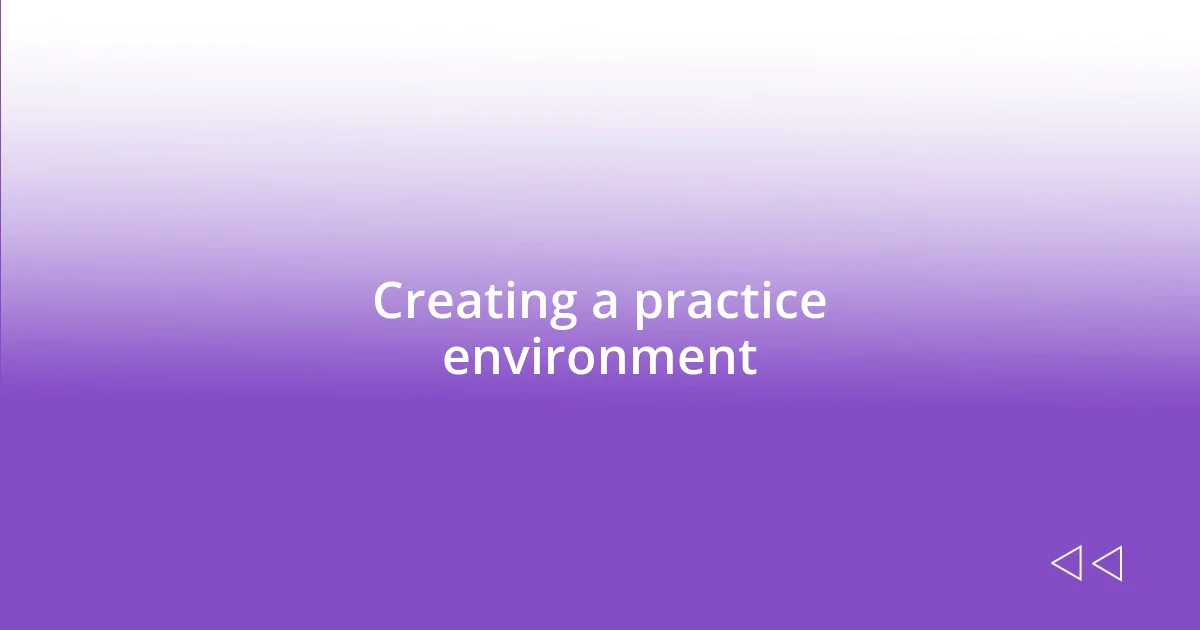
Creating a practice environment
Creating a practice environment is essential for effective music practice. I’ve discovered that a designated space can significantly influence my focus and creativity. I remember when I created a corner in my living room just for practicing; having that space made me feel like I was stepping into a different world where music was my only priority.
Lighting can also play a huge role in how I feel while practicing. I often use warm, soft lighting to create an inviting atmosphere that eases my nerves before a practice session. Have you ever noticed how the right lighting can transform your mood and inspire your creativity? In those moments, I’ve felt like everything flows more naturally.
Finally, minimizing distractions is crucial for me. I try to keep my phone in another room, and I make a point to communicate with others in my household when I’m practicing. It’s amazing how much more I can achieve in a focused environment. What strategies do you use to stay in the zone when you practice?
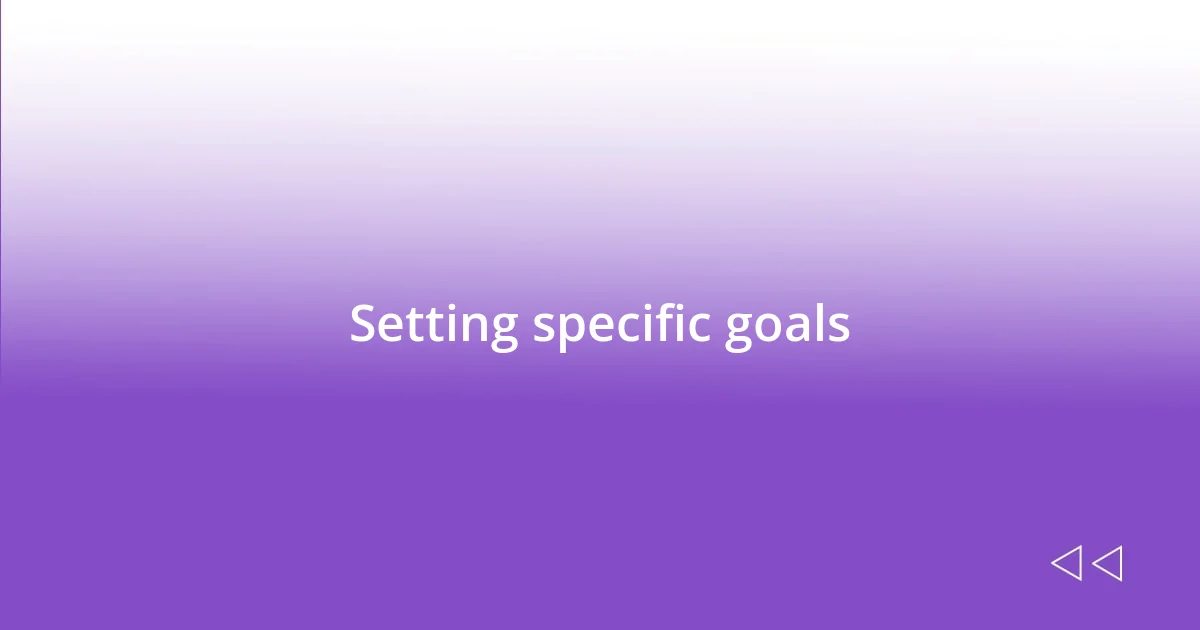
Setting specific goals
Setting specific goals is crucial for a structured and fruitful practice session. From my experience, vague ambitions like “getting better” are far too broad. I remember a time when I decided to tackle a challenging piece; I broke it down into smaller sections and set concrete timelines for each. This approach not only kept me motivated but also helped me measure my progress more effectively.
Here’s a simple list of goal-setting strategies that I’ve found particularly useful:
- Be specific: Instead of saying “I want to improve my scales,” state “I will master my C major scale at 120 BPM by next Friday.”
- Set measurable targets: Define what success looks like. For example, “I will play the first 16 measures of my song without errors.”
- Break it down: Divide larger pieces or concepts into manageable segments, like practicing two bars at a time.
- Create deadlines: Assign a time frame for each goal to instill a sense of urgency. This can lead to more focused sessions.
- Reflect regularly: Take time to review your goals every week and adjust them based on your progress and feelings.
By incorporating these strategies, I’ve noticed a clear shift in my motivation and skill advancement. There’s something incredibly satisfying about checking off those little victories along the way!
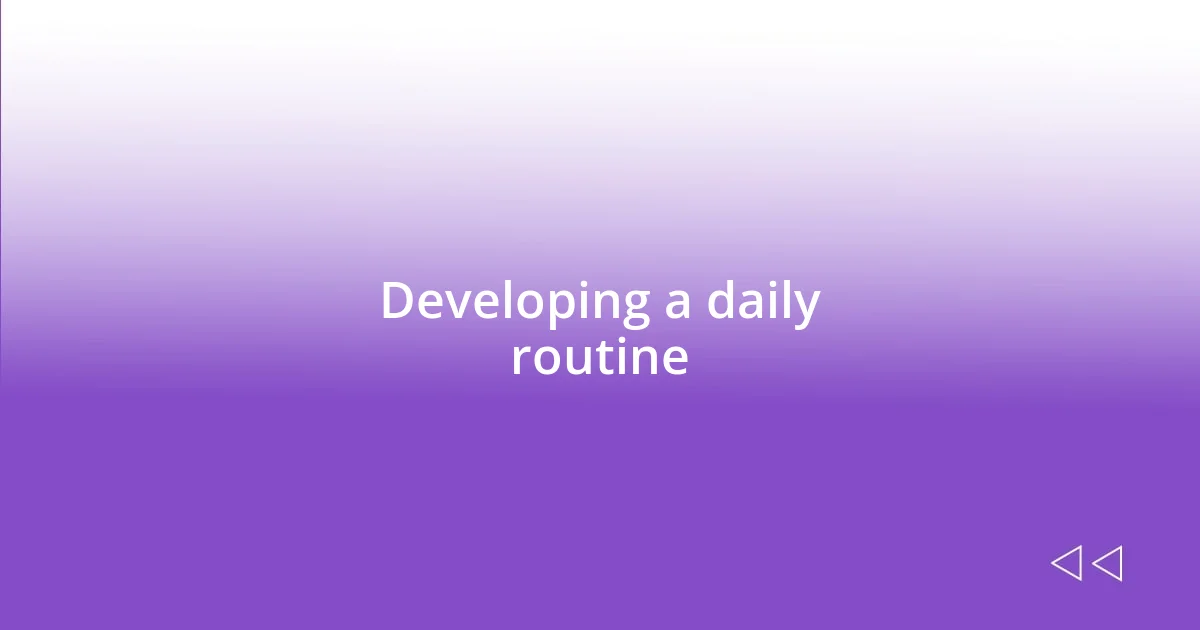
Developing a daily routine
Developing a daily music practice routine is something I’ve found to be transformative in my musical journey. I’ve noticed that having a consistent time for practice shapes my mindset. For instance, practicing in the morning allows me to start my day with creativity, making me feel accomplished before I even step out of the house. Have you ever experienced how a morning routine sets a positive tone for the rest of the day?
It’s also essential to keep the routine flexible. I remember a time when I was rigid with my practice schedule and ended up feeling overwhelmed. Learning to adapt—whether it’s shifting practice times or adjusting goals for the day—has had a profound impact on my experience. Life happens, and sometimes embracing spontaneity can lead to breakthroughs. What about you? How do you keep things fresh and engaging in your routine?
To make the most out of my practice time, I often incorporate short but intense sessions, followed by breaks. This strategy stems from my realization that quality trumps quantity. Focusing intently for 25 minutes and then taking a 5-minute break has improved my concentration and enjoyment. It’s like rediscovering the thrill of music every day, and I encourage you to experiment with this technique.
| Aspect | My Insights |
|---|---|
| Time of Day | Morning practice boosts my mood and creativity. |
| Flexibility | Adaptability keeps my routine enjoyable and less stressful. |
| Session Length | Short sessions with breaks enhance focus and passion. |
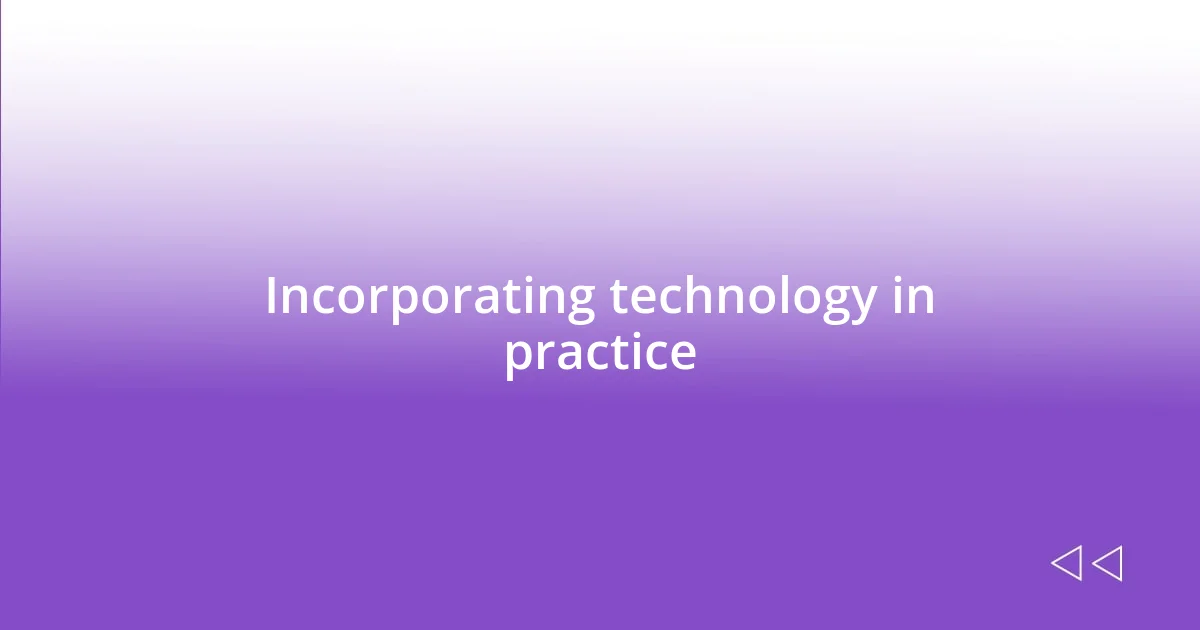
Incorporating technology in practice
Incorporating technology into practice has become a game-changer for me. I vividly remember the thrill of discovering music apps that allow for slow playback of recordings; they let me learn difficult passages at my own pace. Have you ever tried changing the tempo on a piece to help with challenging sections? It’s like turning a mountain of notes into a series of small, achievable hills.
I’ve also found that utilizing recording software has deepened my understanding of my performance. Listening back to my practice sessions often reveals nuances I might miss in the moment. It’s surprising how much clarity can come from hearing something again. How valuable would it be for you to identify those tiny mistakes that slip through during live play?
Moreover, engaging with online resources, like tutorial videos and forums, has expanded my musical horizons. I can explore various styles and techniques that I never would have encountered in a traditional setting. Connecting with other musicians online has sparked countless ideas and has made my practice feel less isolating. I’ve even attempted some collaborative projects virtually, which brought a sense of community that I genuinely cherish. What trends in music technology have inspired your practice lately? Let’s dive into those tools that can bring our skills to the next level!
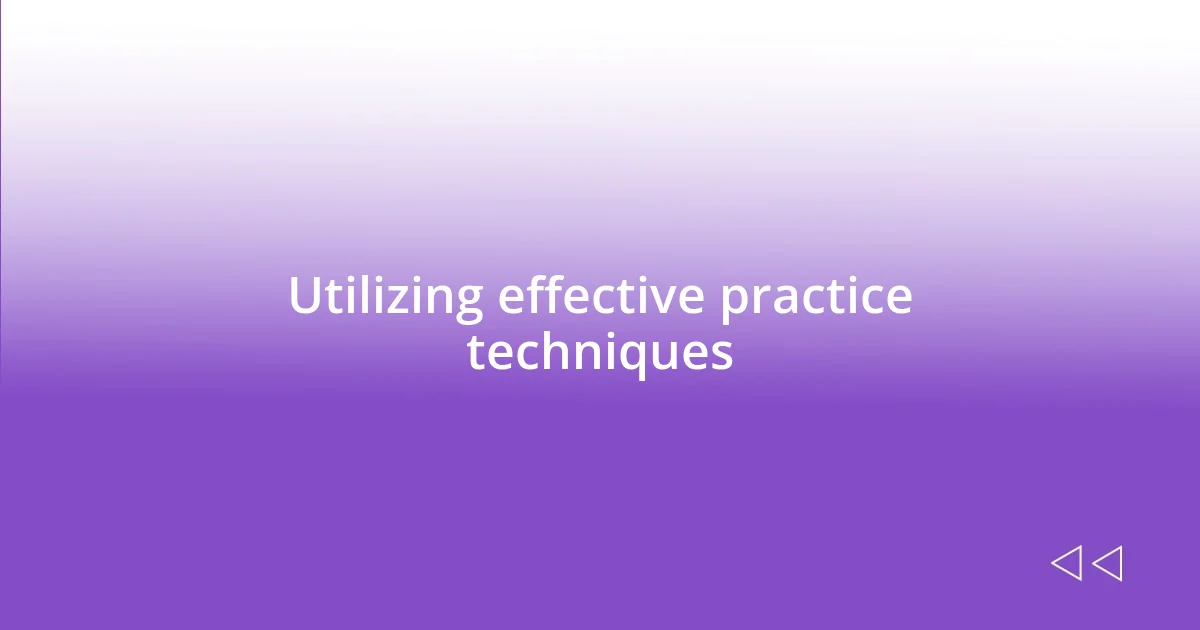
Utilizing effective practice techniques
I find that employing visualization techniques has brought a refreshing twist to my practice sessions. Before picking up my instrument, I often close my eyes and picture myself executing a piece flawlessly. It’s almost as if I’m rehearsing in my mind, which helps solidify the muscle memory and confidence I need. Have you ever considered how your imagination could boost your real-world performance? It’s a tool I encourage everyone to explore.
Another technique that has genuinely transformed my practice is chunking complex pieces into manageable sections. When I worked on a particularly challenging sonata, I dissected it into smaller parts, focusing on just a few measures at a time. By practicing these mini-sections repetitively, I found that the whole piece began to feel less daunting. I could genuinely immerse myself in mastering each fragment. How do you approach challenging sections in your music?
Lastly, incorporating mindful breathing exercises before and during practice has remarkably enhanced my focus and creativity. I often take a moment to inhale deeply and clear my mind of distractions. This simple act grounds me and reignites my passion for the music. Have you ever noticed how deep breathing can revitalize not just your body, but your spirit too? I believe nurturing both body and mind is essential for any musician seeking to connect more deeply with their art.
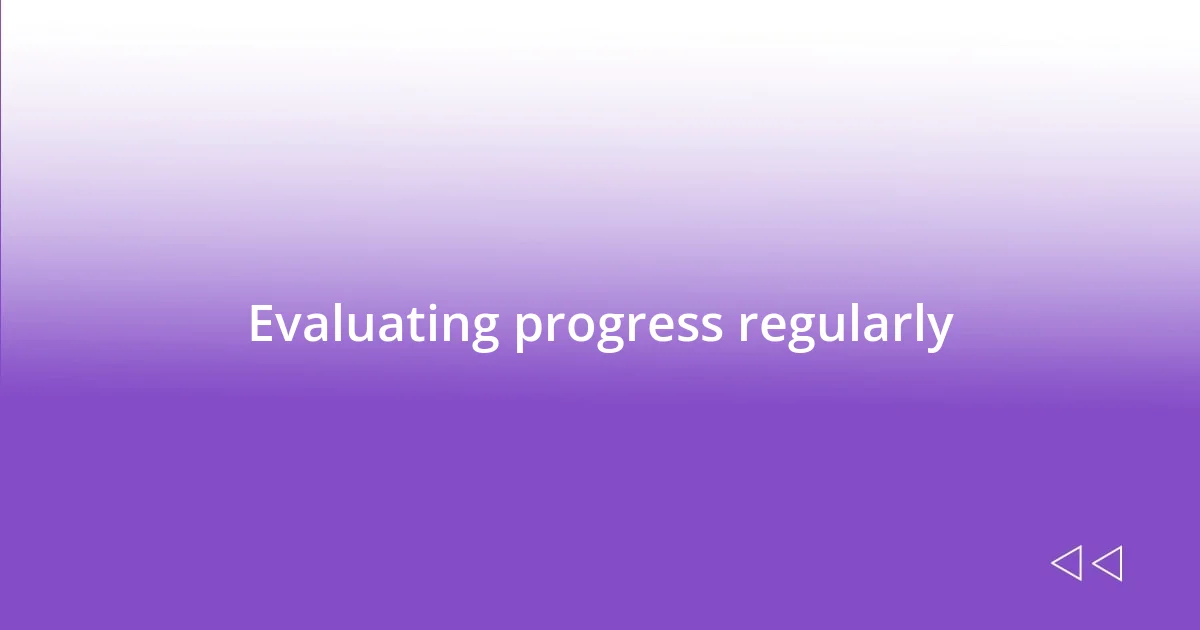
Evaluating progress regularly
Regularly evaluating progress is something I firmly believe can transform your practice. I remember the first time I recorded myself and then played it back. The difference between what I thought I sounded like and the reality was quite startling. Have you ever experienced that moment when you realize there’s more to uncover in your playing? It’s a profound wake-up call that can guide you to focus on specific areas for improvement.
After each practice session, I make it a point to jot down notes about what went well and where I struggled. This reflection isn’t just about identifying mistakes; it’s also a way to celebrate small victories, like nailing a tricky passage. I’ve learned that acknowledging these wins keeps me motivated, making it feel less like a chore and more like a rewarding journey. How do you keep track of your own progress? Establishing a method that resonates with you can make evaluations much more meaningful.
I also find it helpful to set measurable goals for myself. For instance, I remember working towards mastering a piece for an upcoming performance. By breaking that down into weekly goals—like achieving a certain level of speed or accuracy—I was able to visually track my progress. It’s gratifying to see growth over time and to know I’m on the right path, step by step. What goals have you set for your music practice lately? Having clear milestones can really shape the direction of your journey.
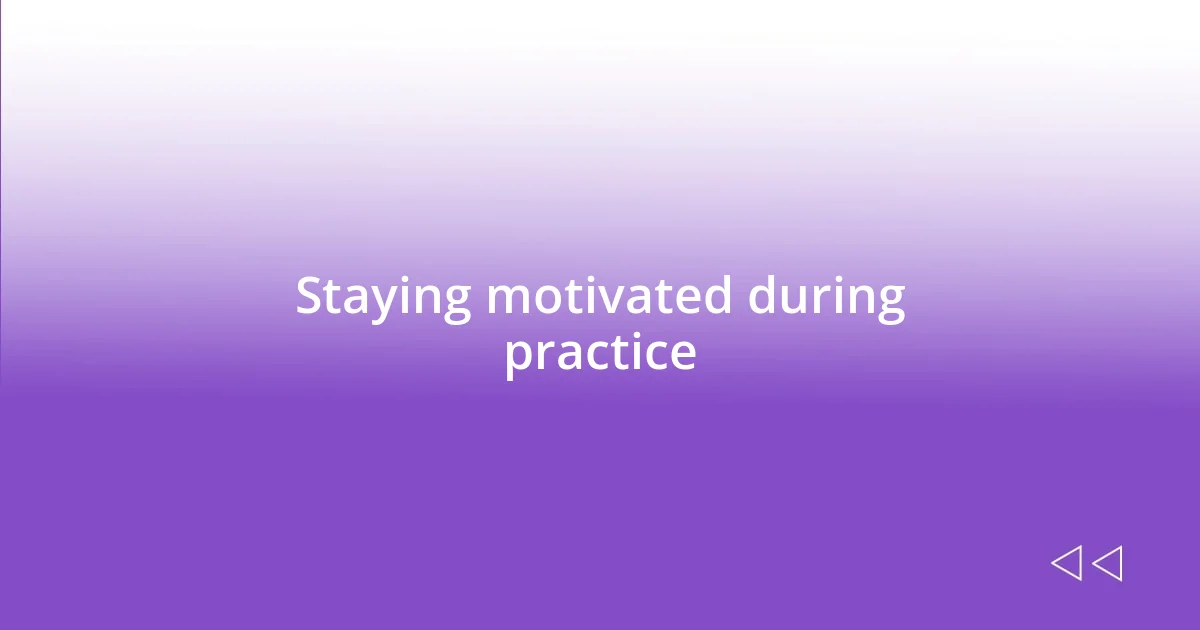
Staying motivated during practice
Staying motivated during practice can sometimes feel like a rollercoaster ride. I recall a time when my enthusiasm dipped, and I dreaded walking into my practice room. To combat that, I started introducing a reward system for myself. For every successful run-through of a passage, I’d treat myself to something small—a favorite snack or a couple of minutes on social media. It became a playful way to intertwine enjoyment with the effort of practice. Have you tried using rewards to boost your motivation?
Another approach that has worked wonders for me is transforming practice sessions into mini-concerts. I choose a piece I’m working on and play it for friends or family members, often turning what felt like a mundane practice into an exciting performance. The energy I receive from their encouragement reignites my passion for the piece, making practice feel less solitary and more of a shared experience. Isn’t it amazing how an audience can shift your perspective on practice?
Lastly, connecting with other musicians plays a significant role in my motivation. Joining a group or attending workshops can be incredibly inspiring. I remember a specific workshop that ignited my love for improvisation again. Being surrounded by passionate people who share the same challenges and triumphs reignited my desire to experiment and explore. Have you considered how the company you keep might influence your dedication to your craft? It’s a powerful reminder that music is, at its core, a communal experience.












